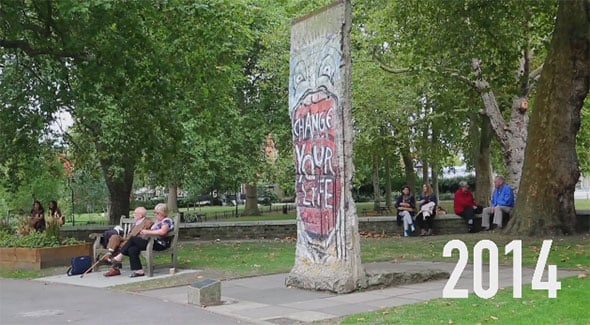Latest Google Doodle Commemorates The Fall Of The Berlin Wall
Lifetimes are filled with iconic moments, and in mine, one of them is the fall of the Berlin Wall, an event that occurred 25 years ago. What once served as a concrete barrier between West Berlin and East Germany, and a symbolic divide between democracy and Communism, came crumbling down on November 9, 1989. I wasn't quite a teenager at the time, so while I remember the event, I hadn't fully grasped the significance of the moment. Silly as it may sound, something as simple as a Google Doodle provides an opportunity to revisit the occasion and reflect on it from a different state of mind that isn't focused on recess.
"This graffitied chunk of concrete, once a literal division, has been transformed into a symbol of unity, a reminder to passersby of the triumph of the collective human spirit. It was moving to see it in person and, appropriately enough, spray-painted on this special slab are the German words 'Wir lieben dich' — 'we love you'," Ryan Germick and Liat Ben -Rafael, members of the Google Doodle Team, wrote in a blog post.
"This graffitied chunk of concrete, once a literal division, has been transformed into a symbol of unity, a reminder to passersby of the triumph of the collective human spirit. It was moving to see it in person and, appropriately enough, spray-painted on this special slab are the German words 'Wir lieben dich' — 'we love you'," Ryan Germick and Liat Ben -Rafael, members of the Google Doodle Team, wrote in a blog post.
The music in the video above was composed by Nils Frahm. Having grown up in Germany, he was 7-years-old when the Berlin Wall fell. He remembers seeing "strangers hugging strangers" with "tears in their eyes," singing, and all-around celebrating. Like myself, he was "too young to understand" what was really going on, but he never forgot.
"Now it is our obligation to tell this story to all those who couldn't be there, who could not feel the spark of the peaceful revolution themselves and more importantly who can't remember how existence feels when its incarcerated by concrete walls. It is time to celebrate 25 years of unity," Frahm says.

Other than its historical focus, this particular Google Doodle is noteworthy because of the work involved. The folks at veed.me arranged 17 international film crews to gather footage, while the German Federal Archives provided archival photographs by Klaus Lehnartz and Heiko Specht. And on top of that, Googlers from every corner of the world translated it into more than 50 international versions.
Well done, Google and company.
"Now it is our obligation to tell this story to all those who couldn't be there, who could not feel the spark of the peaceful revolution themselves and more importantly who can't remember how existence feels when its incarcerated by concrete walls. It is time to celebrate 25 years of unity," Frahm says.

Other than its historical focus, this particular Google Doodle is noteworthy because of the work involved. The folks at veed.me arranged 17 international film crews to gather footage, while the German Federal Archives provided archival photographs by Klaus Lehnartz and Heiko Specht. And on top of that, Googlers from every corner of the world translated it into more than 50 international versions.
Well done, Google and company.

